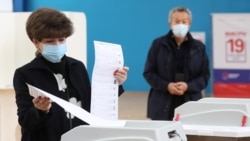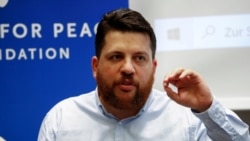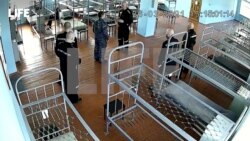The Kremlin-backed ruling United Russia party has claimed it won a two-thirds supermajority in Russia’s lower house of parliament, after three days of voting marred by mounting opposition claims of irregularities and ballot tampering.
The election is widely seen as an important part of Russian President Vladimir Putin’s efforts to cement his grip on power ahead of a possible run in the 2024 presidential election, making control of the State Duma key.
The vote also has been marred by the lack of a significant opposition presence after authorities declared organizations linked to imprisoned opposition figure Aleksei Navalny to be “extremist,” effectively barring anyone from his network from running.
For the first time since 1993, election observers from the Organization for Security and Cooperation in Europe (OSCE) were not present due to limitations imposed by Russian authorities.
With 90% of ballots counted, the Central Election Commission said early on September 20 that United Russia, which backs President Vladimir Putin, had won 49.66% of the vote for the new State Duma.
Its closest rival, the Communist Party, had 19.56%, and the nationalist Liberal Democratic Party received 7.51%. Two other parties, A Just Russia and a newcomer party, New People, had received 7.38% and 5.33%, respectively.
Claiming a majority in the new Duma, United Russia Secretary-General Andrei Turchak told supporters at party headquarters that the victory was "honest and clean.”
Early on September 20, Turchak said United Russia expected to win 120 seats from the party-list voting and 195 single-mandate races — giving it 315 of the Duma's 450 seats and a comfortable two-thirds majority that continues to allow it to change the constitution.
The results from online voting in Moscow, a city of 12 million people, have not yet been tallied.
One of Navalny’s top lieutenants, Leonid Volkov, suggested that authorities planned to manipulate online voting in favor of ruling party candidates, particularly in liberal-leaning cities like Moscow and St. Petersburg.
The Central Election Commission said it would publish the Moscow results on the evening of September 20.
Half of the Duma’s 450 seats are apportioned by party lists, while the other half are chosen in individual races. Election officials said United Russia candidates led in 194 single-seat constituencies out of 225 with a little over 72% of the votes counted.
United Russia, which currently holds 334 seats in the 450-seat Duma, is looking to keep its supermajority in the legislature. But the party is deeply unpopular, and surveys from independent pollsters have shown its approval rating at the lowest level in the two decades since it was first established.
In the last national vote in 2016, United Russia won just over 54% of the vote.
Apathy is another major concern for the authorities, as Russian voters grow increasingly cynical about how free and fair elections are in the country. Turnout in the election was around 45%, the Central Election Commission said.
In addition to being a test for United Russia, the three-day vote was also a major hurdle for Navalny, the jailed corruption crusader whose allies had invested heavily in their Smart Voting strategy, aimed at eroding United Russia’s stranglehold on politics.
Most of the candidates endorsed by Smart Voting were from the Communist Party — even though it and two other parties in the Duma rarely vote against majority initiatives or those explicitly lobbied for by the Kremlin.
"If the United Russia party succeeds, our country will face another five years of poverty, five years of daily repression, and five wasted years," a message on Navalny's Instagram account read on the eve of the elections.
Despite official efforts to undermine Smart Voting, initial election results suggested the initiative may have had an impact, with support for the Communists growing from 13.3% in the 2016 parliamentary elections.
In recent months, authorities have unleashed a sweeping crackdown against Navalny’s political network, with many of his allies fleeing the country, put under house arrest, or detained.
Navalny himself is in prison serving a 2 1/2-year sentence on charges his allies say were politically motivated. He was arrested in January upon returning from Germany where he had been recuperating from a nerve-agent poisoning he blamed on the Kremlin.
As the vote kicked off on September 17, however, Navalny’s Smart Voting app disappeared from the Apple and Google online stores. Telegram, a popular messaging app and a key tool for Navalny’s team to get out its messaging, also removed a Smart Voting bot. YouTube — which is owned by Google — also took down a video that contained the names of candidates they had endorsed. And Google also blocked access to a Navalny Google Doc, which circulated a text copy of all the Smart Voting endorsed candidates.
About 50 websites run by Navalny have also been blocked, including the one dedicated to Smart Voting.
Long lines
The vote, which is being held alongside elections for regional governors and local legislative assemblies, took place amid widespread reports of irregularities.
Gennady Zyuganov, who heads the Communist Party, alleged widespread violations and called on election officials to respond to reports of “a number of absolutely egregious facts,” including ballot-box stuffing.
On the first day of the election, there were unusually long lines at some polling stations. Golos, an independent election-monitoring group, suggested state workers and military personnel were being pressured by United Russia and government authorities to vote.
Across the country, there were reports of ballot-box stuffing and “carousel voting” — where voters are bused into multiple polling stations as an organized group. It’s unclear, however, to what extent the fraud reports would affect the final vote.
Voters interviewed in one Moscow district expressed skepticism toward both the election results and the opposition's chances of influencing them through Smart Voting.
"You can see what's happening with our elections. I don't trust them," said Tatiana Bochkova, a journalist who voted in Moscow's 208th district for Sergei Mitrokhin, a politician for the liberal Yabloko party whom she had backed in previous elections.
"I didn't use Smart Voting, because I don't believe it can really work," Bochkova told RFE/RL.
Sergei Ross, a lawyer who has previously defended opposition activists, said he had followed the recommendation of Smart Voting and chosen Mitrokhin.
He said he doesn't trust the elections but believes that vote-rigging will not be as widespread in Moscow as in other parts of the country.
"The opposition now has more tools at its disposal, like Smart Voting," he said. "But the state does, too, and it's using them against the press and independent journalists."
Vadim, a 63-year-old theater historian at a Moscow academy, said he had voted for the newly created political party, New People, because of its promise to introduce fresh faces into politics.
He broadly trusts the elections because the low turnout makes it harder for authorities to falsify them, he said. He did not agree with critics who said New People was one of several parties launched in cooperation with the Kremlin to create the illusion of real competition.
"We all know officials steal and don't represent the interests of the people. But I think we must vote anyway, to express our position," Vadim said.
In the central Volga region of Chuvashia, the local Communist Party accused a precinct boss of trying to eat part of an official election tally sheet, in a bid to cover a fraudulent tally.
In the North Caucasus, where voter fraud and irregularities are commonplace, four separate precincts in the Daghestan and Ingushetia regions reported 100% turnout — in one case, just a few hours into the first day of voting.
Ballot-stuffing allegations
Authorities said they spread the election over three days to prevent crowding because of the COVID-19 pandemic. Critics, however, say the longer period offers ample opportunities for manipulation and engineering a desired outcome.
In St. Petersburg, an independent election-monitoring group reported that a candidate from the opposition Yabloko party was beaten by police officers at one polling station on September 19 after he claimed that piles of unused ballots had disappeared.
A video shared by activists appeared to show at least three officers manhandling Nikita Sorokin, who is running for the local legislative assembly. Several other monitors are also seen being forcibly removed from the site.
Golos earlier reported some 2,000 procedural violations as well as lax measures for guarding ballots at polling stations, people voting multiple times, as well as dozens of reported incidents of ballot stuffing.
With reporting by RFE/RL correspondents in Moscow, Current Time, RFE/RL’s Tatar-Bashkir Service, RFE/RL’s North Caucasus Service, Meduza, AP, and Reuters.







